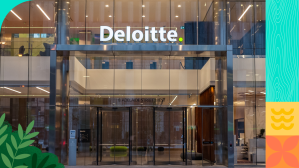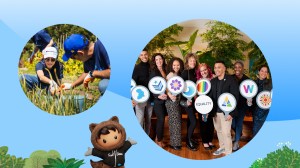Australian businesses need to ensure their AI use is developed and deployed responsibly, ethically, and sustainably, all while harnessing its benefits and maintaining trust with key stakeholders.
This was one of the key themes addressed at the Climate and AI Summit at Sydney’s Salesforce Tower earlier this month, held as part of this year’s Climate Action Week Sydney. Attendees heard how Salesforce is approaching this topic with its Sustainable AI Approach focused on right-sized models, efficient hardware, low-carbon regions, transparency, sustainable use cases, and investments.
Attendees also heard from sustainability leaders across industries who are driving real impact in their sectors.
Driving the news:
Sponsored by Salesforce, Climate Action Week Sydney is a series of community-led events held across Sydney from all aspects of the climate action ecosystem. As AI reshapes how we live and work, Salesforce is working across its operations, ecosystem, and investments to make AI more sustainable and equitable.
This includes leveraging Agentforce for sustainability transformation to improve accuracy and efficiency, accelerating time to compliance, and empowering teams to spend more time taking action against their sustainability goals. It also includes supporting external innovation, enabling nonprofits like Good360 to access leading technology via the AI for Impact Accelerator, as well as the Salesforce’s Ventures Impact Fund, which invests in climate startups such as PanoAI.
“With the rise of agentic AI, we’re seeing how agents can be at the heart of any organisation’s sustainability approach, enabling transformation across sustainable sourcing, sustainability management, sustainable operations and more.”
Alexandra McDonald, Climate & Nature Program Lead, Salesforce Australia and New Zealand
“Today’s businesses are expected to balance innovation with responsibility, and that has never been clearer than when it comes to the use of AI and sustainability,” said Alexandra McDonald, Climate & Nature Program Lead, Salesforce Australia and New Zealand. “With the rise of agentic AI, we’re seeing how agents can be at the heart of any organisation’s sustainability approach, enabling transformation across sustainable sourcing, sustainability management, sustainable operations and more.
“With Agentforce we’re ensuring organisations have the tools to scale their impact and accelerate their missions at every level.”
Go deeper:
Discussion at the event highlighted how sustainability leaders need to view their data and technology teams as critical partners to build trust in AI with all stakeholders and adopt a sustainable AI strategy if they are to leverage the power of AI to accelerate action on climate change and biodiversity loss. Attendees also heard how a comprehensive ESG data strategy can be a critical enabler for their business.
There is also an increasing demand for transparency from AI providers on the environmental footprint and efficiency of their models. Last month, Salesforce launched the AI Energy Score, a first-of-its-kind benchmarking tool that enables AI developers and users to evaluate, identify, and compare the energy consumption of AI models.
“We know one of the biggest barriers to sustainability is the lack of transparency and comparability in AI,” said McDonald. “Without clear benchmarks, it’s hard to know how we’re doing, or how to improve, which is why the AI Energy Score is so important. Allowing easy disclosure and comparison of the energy efficiency of different AI models, it sets a new standard for transparency in AI energy use.”
More information:
- Review the outcomes of last year’s Climate and AI Summit
- Learn how to Leverage Agentforce for Sustainability Transformation
- Read more about Salesforce’s AI Energy Score















